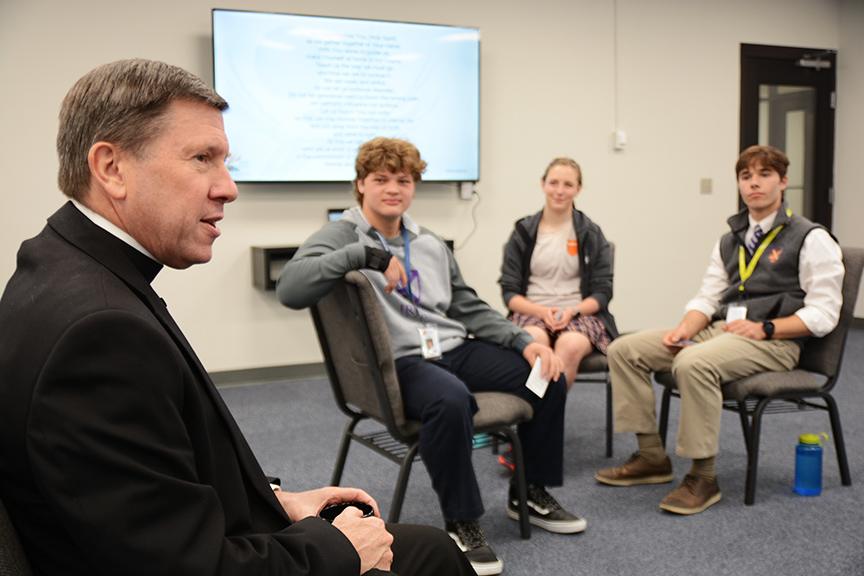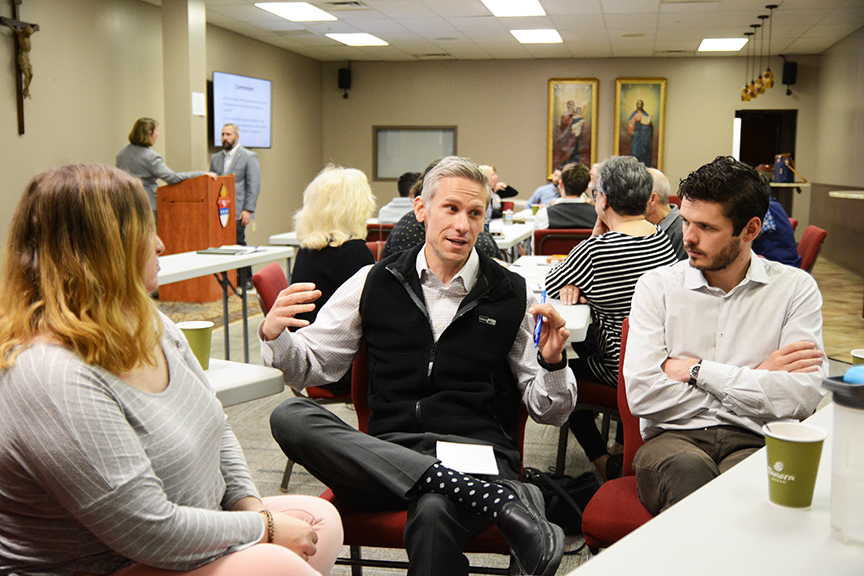
As part of the Synod on Synodality, the Diocese of Nashville has invited people to attend listening sessions at churches, schools, and other settings to discuss how the Church is living out its mission.
The people who are facilitating those listening sessions have found those participating are eager to join the discussion and appreciative of the opportunity.
“As a general rule, everybody was happy to participate,” said Mandi Pitt-Reed, pastoral assistant at St. Ann Church in Nashville, who organized the listening sessions there. “A lot of folks were eager to have their perspective heard and wanted their voices heard.”
Pitt-Reed was one of 25 facilitators who gathered at the Catholic Pastoral Center on Thursday, April 21, to participate in their own listening session and to give feedback on the synod process. Her comments were echoed by other facilitators who have had a similar experience.
Julie Bolles facilitated a listening session for the residents at Villa Maria Manor, which offers affordable, high-quality housing for the elderly. She found the people participating at Villa Maria Manor respectful with one another, even when they disagreed.
“They listened really well to one another … and they asked questions of one another,” Bolles said. “I was really impressed by that.”
At St. Frances Cabrini Church in Lebanon, Rosa Rivera-Mizzoni, the assistant director of religious education who facilitated several listening sessions there, found the session with the church’s teens interesting and surprising.
“With the kids was absolutely the best session,” Rivera-Mizzoni said. “They were all excited that I wanted to hear what they had to say about our Church.”
The teens expressed an interest in more opportunities for Eucharistic adoration, she said. “That surprised me.
“They were tired of being talked to instead of just listening to God,” Rivera-Mizzoni said. “It brought me to tears.”
At St. Ann, Pitt-Reed scheduled listening sessions with groups already meeting at the church, such as religious education classes, students at St. Ann School, RCIA classes, parents of Sunday school students, and others.
“I’m trying to get as many perspectives as we can,” Pitt-Reed said.
“I was surprised how positive folks were,” she said. “Some said you’re already doing a good job, which was nice to hear.”
Some of the people participating in the listening sessions expressed a desire to participate more in the life of the parish, but weren’t sure how to do that, Pitt-Reed said. “They want to be empowered.”
Knowing that will require a shift in her approach to her job as part of the church staff, Pitt-Reed said, including the possibility of using new strategies to reach people in the pews.

Pitt-Reed was surprised that most of the discussion questions used at the listening sessions were focused on life in a parish, rather than issues facing the Church as a whole. The discussions of those questions prompted many comments and suggestions that the parish can address now, rather than waiting for the two-year synod process to finish, she said.
“We’re going to have to look at these ideas and what can we add to what we’re already doing,” Pitt-Reed said. “Some of these are pretty easy changes that we can make.”
Pope Francis has called on every diocese in the world to participate in the synod, “in which the entire People of God engage in mutual dialogue and authentic listening to foster the Church’s communion, participation and mission,” according to Vatican documents on the synod.
Synodality is defined as “a way of being by which the Church lives out her mission in dialogue with the living voice of the People of God and in openness to the guidance of the Holy Spirit.”
There are three phases of the synod. The first is at the diocesan level in which listening sessions and a survey were conducted to collect comments. The consultation process is now closed.
The diocese’s co-contacts for the synod, Erin Stracener, director of the diocesan Tribunal, and Dr. Brad Peper, the director of the diocesan Office of Faith Formation, will review the comments collected during the various listening sessions and compile a 10-page synthesis.
That document, which will be made available to the public on the diocesan synod website, will be sent to the U.S. Conference of Catholic Bishops and will posted on the Diocese of Nashville’s website in July. Officials at the USCCB will prepare a document based on the syntheses from dioceses across the country. That document will be forwarded to Vatican officials preparing for the Synod of Bishops, scheduled for October 2023.
For more information about the synod, visit www.dioceseofnashville.com/synod.









